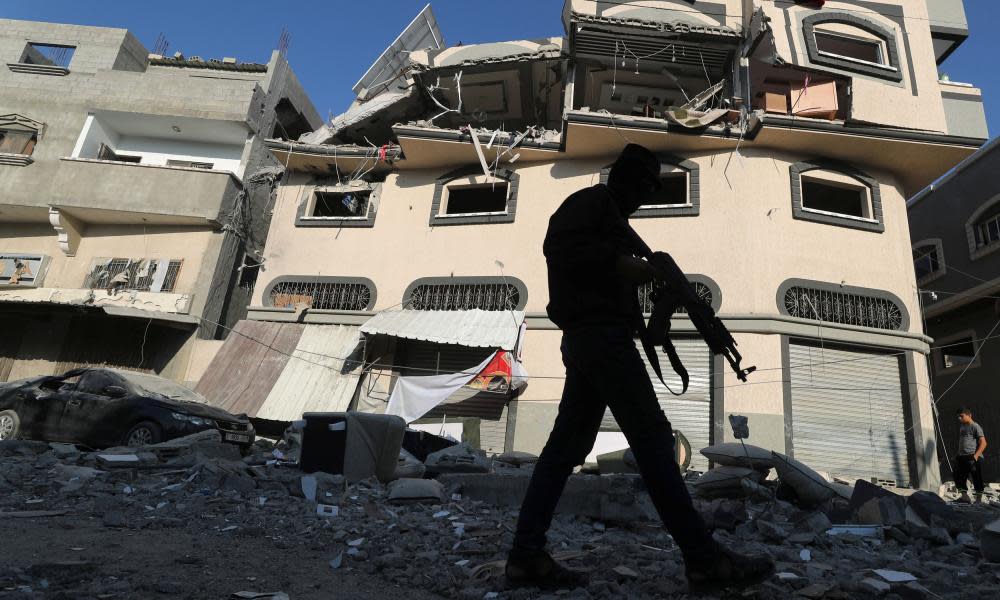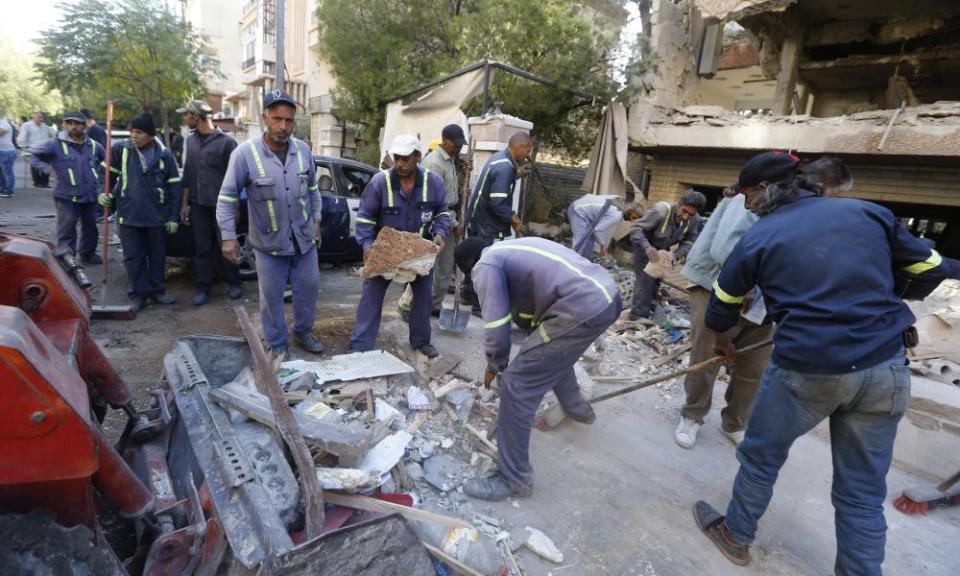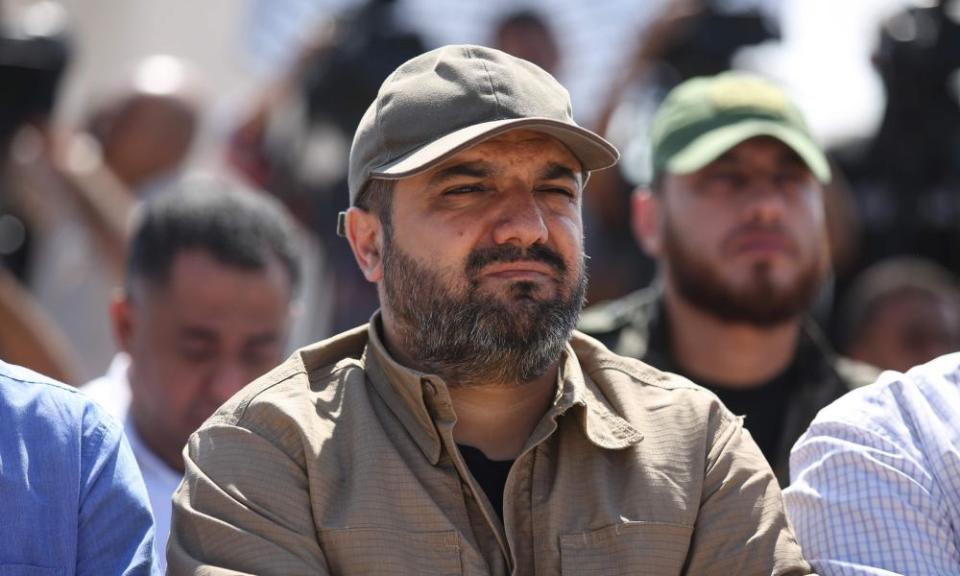Israel strikes on Islamic Jihad chiefs prompt reprisal rocket attacks

Israel has launched airstrikes in Gaza and Syria against two senior figures from the militant group Islamic Jihad in rare targeted assassination attempts that immediately prompted retaliatory rocket fire from Gaza.
Baha Abu al-Ata, a 42-year-old Palestinian Islamic Jihad commander, and his wife were killed in their home in Gaza City, the Iran-backed group said in a statement. Two other people, believed to be their children, were wounded.
Islamic Jihad is the second-largest Palestinian militant faction in Gaza after the strip’s rulers, Hamas.
Set up in the late 1970s and early 80s by hardline Islamists, the group has roots in Palestinian refugee camps and is believed to comprise a few thousand fighters. Considered an Iranian proxy force, its leadership is based in the Syrian capital, Damascus. Israel says the group receives millions of dollars in Iranian funding each year.
Both Hamas and Islamic Jihad call for Israel’s destruction, attack civilians and are widely designated as terrorist groups. Between the two, Islamic Jihad is deemed more aggressive and reckless, especially as it can focus on military activities rather than governing 2 million people in the Mediterranean enclave.
While Hamas and Islamic Jihad maintain a cautious alliance, the latter is believed to have become frustrated with the unofficial truces between Hamas and Israel. Oliver Holmes
An Israeli army statement accused Abu al-Ata of coordinating repeated rocket launches, as well as sniper fire, on Israel over the past year. It described him as a “ticking bomb”.
“Abu al-Ata was promoting preparations to commit immediate terror attacks in various ways towards Israeli civilians and [Israel Defense Forces] troops during the recent few days,” the statement said. His killing was a “direct act to remove an imminent threat”.
The office of Benjamin Netanyahu said the prime minister had signed off on the killing, which came days after the appointment as defence minister of Naftali Bennett, a hardline nationalist who has been calling for more aggressive action in Gaza.
More than 180 miles (300km) away in Damascus, Syrian state media said Israel fired three missiles at the home of an Islamic Jihad political leader, Akram Al-Ajouri.
He survived, but his son and granddaughter were killed, state media said. Photos from Damascus’s Mazze neighbourhood showed damage to a two-storey building.

Unlike the attack in Gaza, Israel did not confirm it had launched a strike in Syria.
Targeted assassinations of members of enemy factions, once a mainstay of Israeli policy, have been largely abandoned in recent years as they often served to raise tensions and senior posts held by dead leaders were soon filled again.
Tuesday’s pre-dawn strikes threatened to escalate a conflict between Israel and Iran, which has proxies such as Islamic Jihad across the region.
Israel has increasingly targeted Iran’s allies and even its forces, especially in neighbouring Syria, where Tehran has gained a significant foothold amid the civil war.
To block Iran’s military expansion, Israel has carried out hundreds of strikes in Syria, but it normally does not acknowledge them, fearing reprisals.
In Israel, the strikes come during a period of domestic political paralysis. Netanyahu remains prime minister but has failed to gain outright wins in two inconclusive elections this year.
His main rival, the former military chief Benny Gantz, is trying to forge a coalition government to succeed him. If Gantz fails, Israel could hold an unprecedented third election in one year.
Netanyahu has sought to convince Israelis that he is the only leader able to keep them safe. However, a regular jab at the prime minister used by his domestic critics, and even some of his more hawkish allies, has been his perceived dithering around how Israel should deal with bouts of rocket fire from Gaza.
Gantz, who has been calling for tougher action on Gaza, said he supported the latest military strikes. “Every terrorist who threatens our security should know that he will end up dead,” he said.

Israel and militants in Gaza have frequently clashed during the past two years, with Israeli jets and helicopters bombing the strip while Palestinian fighters launch projectiles on nearby Israeli towns and cities. Normally the flare-ups die down after a day or two, with no apparent gains for either side.
Palestinian Islamic Jihad warned on Tuesday that the group’s “inevitable retaliation will rock the Zionist entity”, referring to Israel.
More than 75 rockets had been fired into Israel by midday on Tuesday. Rocket sirens in Israel sounded in multiple cities near the Gaza frontier, and even as far north as the commercial capital, Tel Aviv. Schools were closed across southern and central Israel, and civilians were instructed to stay near bomb shelters and to not go to work. It was not clear if there were any casualties.
Hamas, which holds power in Gaza, has fought three wars with Israel but in recent months agreed to Egypt-mediated truce agreements that have mostly held. Still, the group warned that Israel “bears full responsibility for all consequences of this escalation” and promised that Abu al-Ata’s death “will not go unpunished”.
Islamic Jihad, Gaza’s second most-powerful group, has an on-off alliance with Hamas, but Islamic Jihad militants have at times ignored the truce.
Reuters contributed to this report

 Yahoo News
Yahoo News 
